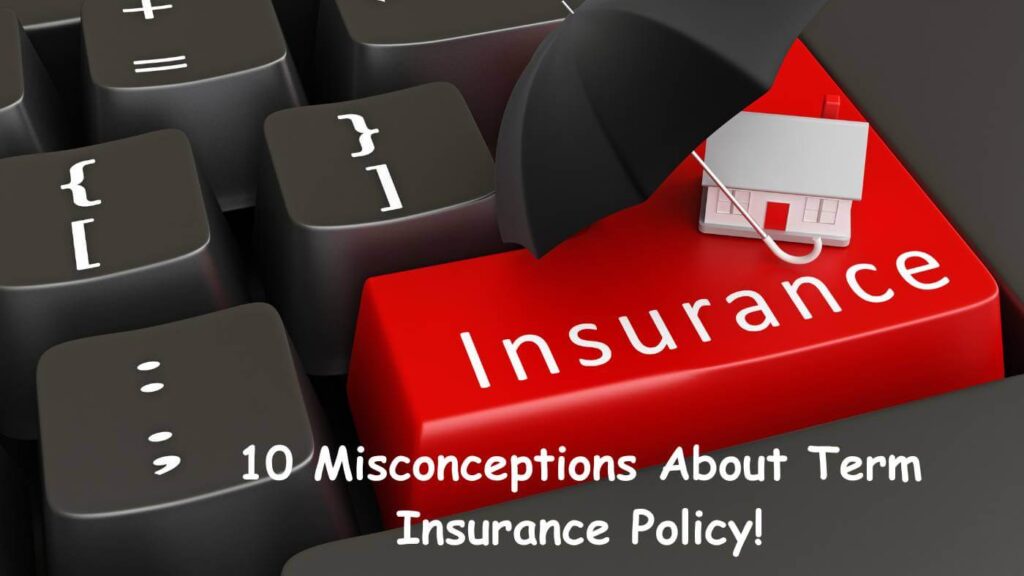In financial planning, few things confuse people as much as term insurance. When discussing securing our family’s financial future, addressing the common misconceptions about term insurance is crucial. These misconceptions can make it hard to understand how valuable and helpful term insurance is, leading to the wrong choices and not protecting ourselves and our families enough.

Common Misconceptions About Term Insurance And The Truths Behind Them:
Misconception 1: Buying a Policy Early Saves Premiums
Truth: While securing a policy early to lock in lower premiums is tempting, it’s only necessary if you have dependents. Wait until you have financial dependents before investing in a term insurance policy to ensure it serves its intended purpose.
Misconception 2: Certain Deaths Aren’t Covered
Truth: Term insurance policies typically cover all types of death except suicide within the first year. Unless explicitly mentioned in the policy’s proposal document, asking your agent for a list of covered deaths is unnecessary.
Misconception 3: Riders Are a Cheap Alternative
Truth: Riders may seem like a cost-effective solution, but it often has limitations. While some, like Waiver of Premium in Critical Illness or Disability, are recommended, others may not provide comprehensive coverage compared to standalone policies.
Misconception 4: Best Claim Settlement Ratio Guarantees Payout
Truth: Relying solely on the Claim Settlement Ratio does not provide a comprehensive picture of the insurer’s claims experience or the proportion of claims settled regarding their value. When choosing an insurer, it’s essential to consider other factors beyond this ratio.
Misconception 5: 20x Salary Cover Amount is Sufficient
Truth: The 20x salary rule has limitations and may not adequately cover your family’s needs. Consider your lifestyle, commitments, and plans to determine the appropriate coverage amount.
Misconception 6: Wife Automatically Receives Claim Amount
Truth: Creditors have the first right to any term insurance claim amount, even before your family receives it. Protect your family’s financial security by opting for a policy under the Married Women’s Property Act (MWP), ensuring the claim amount goes directly to your wife.
Misconception 7: Term Insurance is Only for Breadwinners
Truth: While term insurance is often associated with primary earners, it can benefit non-working spouses, too. Non-working spouses contribute to the household in various ways, such as childcare and managing household expenses. Term insurance for a non-working spouse can cover costs associated with their contributions in the event of their passing.
Misconception 8: Term Insurance is Expensive
Truth: Term insurance is one of the most cost-effective ways to secure substantial coverage. Compared to alternative life insurance products, term insurance provides significant coverage for a relatively modest premium. With careful evaluation and comparison of quotes, you can find an affordable term insurance policy that meets your needs.
Misconception 9: Term Insurance Lapses if I Don’t Die During the Policy Term
Truth: Unlike traditional life insurance policies offering cash value or investment components, term insurance provides death benefit coverage for a specified term. The coverage ends if you outlive the policy term, but there’s no investment or cash value loss. It’s important to renew or extend your term insurance policy if you still require coverage after the initial term expires.
Misconception 10: I Don’t Need Term Insurance if I Have Employer-Provided Coverage
Truth: While employer-provided life insurance coverage can offer some protection, more is needed to meet your family’s needs. Employer-provided coverage is typically tied to employment and may end if you change jobs or retire. The coverage amount may also need to adequately cover your family’s financial obligations. An independent term insurance policy ensures continuity of coverage and offers customisable benefits tailored to your specific needs.
Addressing these additional misconceptions, you can better understand term insurance and make informed decisions to protect your family’s financial future.
Key Takeaways:
You can make well-informed decisions when purchasing term life insurance by debunking these misconceptions and understanding their truths.
Remember these key takeaways:
- Term insurance covers most types of death, except suicide, within the first year.
- Choose riders carefully and opt for comprehensive coverage when necessary.
- Consider more than just the Claim Settlement Ratio when evaluating insurers.
- Calculate your coverage amount based on your specific needs.
- Protect your family’s claim amount by opting for a policy under MWP if married and male.
- Term insurance is not just for breadwinners; it can benefit non-working spouses, too.
- Despite popular belief, term insurance is cost-effective compared to other life insurance products.
- Your term insurance policy stays strong if you outlive the term; consider renewing or extending it if needed.
- Employer-provided coverage may not suffice; consider an independent term insurance policy for comprehensive coverage.
Armed with this understanding, you can effectively manoeuvre through term insurance, ensuring your family’s financial stability for the future.
